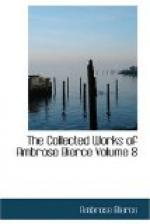“Why comest thou here, presumptuous mortal?” said the Supreme Priest in clear, deliberate tones. “Is it thy unhallowed purpose with this implement to uncover the mysteries of death and break the repose of the Good?”
The Great Mayor, still kneeling, drew from his robe a document with portentous seals: “Behold, O ineffable, thy servant, having warrant of his people, entreateth at thy holy hands the custody of the Good, to the end and purpose that they lie in fitter earth, by consecration duly prepared against their coming.”
With that he placed in the sacerdotal hands the order of the Council of Aldermen decreeing the removal. Merely touching the parchment, the Supreme Priest passed it to the Head Necropolitan at his side, and raising his hands relaxed the severity of his countenance and exclaimed: “The gods comply.”
Down the line of prelates on either side, his gesture, look and words were successively repeated. The Great Mayor rose to his feet, the choir began a solemn chant and, opportunely, a funeral car drawn by ten white horses with black plumes rolled in at the gate and made its way through the parting crowd to the grave selected for the occasion—that of a high official whom I had treated for chronic incumbency. The Great Mayor touched the grave with his golden spade (which he then presented to the Supreme Priest) and two stalwart diggers with iron ones set vigorously to work.
At that moment I was observed to leave the cemetery and the country; for a report of the rest of the proceedings I am indebted to my sainted father, who related it in a letter to me, written in jail the night before he had the irreparable misfortune to take the kink out of a rope.
As the workmen proceeded with their excavation, four bishops stationed themselves at the corners of the grave and in the profound silence of the multitude, broken otherwise only by the harsh grinding sound of spades, repeated continuously, one after another, the solemn invocations and responses from the Ritual of the Disturbed, imploring the blessed brother to forgive. But the blessed brother was not there. Full fathom two they mined for him in vain, then gave it up. The priests were visibly disconcerted, the populace was aghast, for that grave was indubitably vacant.
After a brief consultation with the Supreme Priest, the Great Mayor ordered the workmen to open another grave. The ritual was omitted this time until the coffin should be uncovered. There was no coffin, no body.
The cemetery was now a scene of the wildest confusion and dismay. The people shouted and ran hither and thither, gesticulating, clamoring, all talking at once, none listening. Some ran for spades, fire-shovels, hoes, sticks, anything. Some brought carpenters’ adzes, even chisels from the marble works, and with these inadequate aids set to work upon the first graves they came to. Others fell upon the mounds with their bare hands, scraping away the




